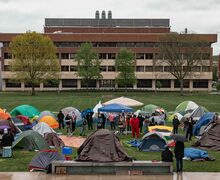Religious leaders expose signs of Apocalypse
The Apocalypse is going to happen on Dec. 12, 2013, according to the Mayan calendar, as prophesized 4,000 years ago.
Last night, the Muslim Student Association brought members of the Christian, Jewish and Muslim community together to discuss the end of the world. The lecture explained multiple viewpoints of Judgment Day from these different ideologies.
‘It informed me on the viewpoints different from mine,’ said Jennifer Vasquez, a freshman communications and rhetorical studies major. ‘My mother is Catholic and my father a Jehovah’s Witness, and coming to this event showed me the similarities and improved my knowledge.’
Rabbi David Levy had the privilege of speaking first to represent the Jewish community, and explained a few points of eschatology and the return of the Messiah.
‘Times are going to roll on, and when it happens its happens, and there is nothing we can do to prevent it, while the other pessimistic view states that the Messiah is around the corner and that we need to prepare for his return,’ Levy said.
Another interesting point Levy brought up is that when Judgment Day arrives, people will revel in monotheism, even though that belief might not be typical of Judaism. He ended his statement by explaining that creation was not actually completed after those six days, and as a result, there is chaos in the world that will remain till the end.
The Rev. Michael McQuitty, an Evangelical Christian, said the idea of the final day is central to who we are and what we believe. He went on to explain that the Evangelical belief is to live life in light of the Judgment Day. McQuitty’s final point is that God will punish those who choose not to know him, and that when the Messiah does return, there will not be a struggle for victory, but that God will just take it all back.
The Rev. Tim Mulligan said society needs to create a central communication system and establish that the kingdom of God is here, but it is not fulfilled. The Catholic view of history is that time is linear, whereas the Greeks believe in a continuous circle, he said.
Fritz Lampe of the Lutheran Campus Ministry spoke from his own tradition.
‘Most what we believe comes from Catholicism, making us reformed Catholics,’ Lampe said.
Lampe believes that the kingdom of God is here, but paradoxically is not here because of all the injustice that surrounds us.
Taquiddin Ahmed, a member of the Islamic Society of Central New York, said there are two parts to this issue, ‘the end of the hour and what happens after that,’ Ahmed said.
Ahmed explained a series of signs described by Muhammad. One sign was the coming of the last messenger from God, which was Muhammad. Ahmed cited Muhammad’s belief that he and the End of the Hour were joined at the hip, and after him, there is nothing else except the waiting for the End of the Hour. Another interesting sign brought up by Ahmed was that when the poor are without proper food and rest, they will compete against each other and build metropolis areas because they are no longer able to survive in the desert.
One point focused on by all the religious representatives was that no one knows when the end will happen except God.
‘My mom told me that you are not judged by who you are, but what you do for others,’ said Emily Santiago, an undecided freshman in The College of Arts and Sciences.
Published on March 1, 2006 at 12:00 pm




